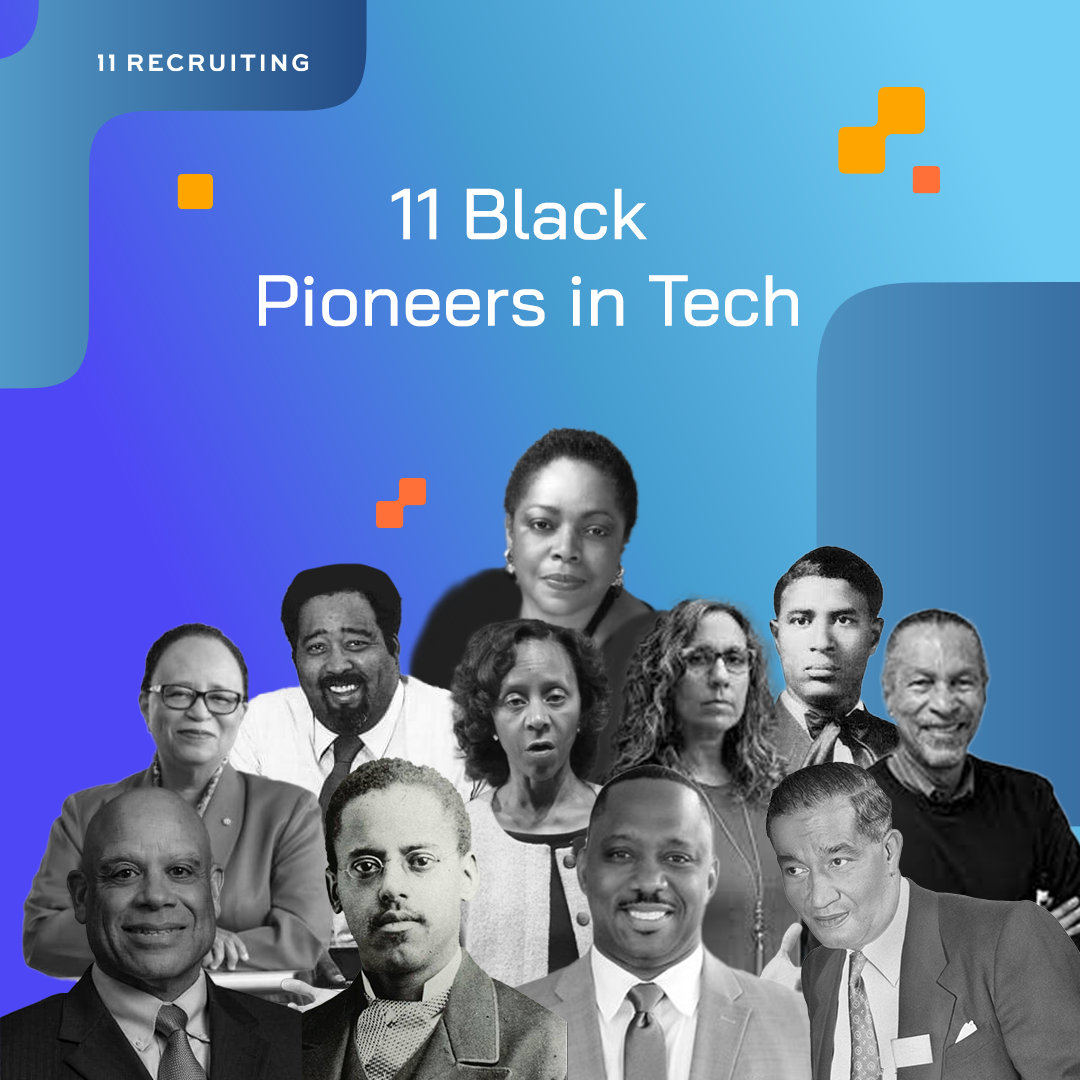
The tech industry is brimmed with black pioneers despite problems in diversity equity and inclusion in the workplace. Their massive tech contributions to the industry are just as relevant and innovative as anyone else— as this article will soon reveal. Below are 11 notable black tech pioneers who are leading and shaping the tech industry!
Disclaimer: Because of the multitude, we simply cannot condense every equally talented black pioneer into one list. We implore our audience to explore and read further about some positions of black people in tech.
Frequently Asked Questions
What are the benefits of diversity and inclusion in the workplace?
With diversity, equity, and inclusion in the workplace, we get access to a broad spectrum of unique individuals with unique perspectives that can help grow an organization’s success. When people of color are aware that they play a crucial part in making their organization and the world a better place, there’s a high level of engagement, commitment, and productivity. It helps organizations stand out with enhanced innovation and reduced employee turnover.
How can we promote diversity and inclusion in the workplace?
In promoting diversity equity and inclusion in the workplace, the first goal is to build a support system for people coming into the space. Through proper and ongoing inclusivity and diversity training, employees stay informed about the traditional and unconscious stigma towards minorities while discussing ways to address them. Improving the harassment and discrimination complaints system and encouraging inclusive languages are also complementary.
What do diversity, equity, and inclusion mean in the tech industry?
Diversity equity and inclusion in the workplace means valuing and accepting people regardless of color, SOGIE, creed, and age. Through this, they are given equal access to tech resources which fosters an environment that acknowledges their background. Luckily, the little exposure to DE&I has helped some black pioneers in tech to break barriers and shape the future of tech.
11 Black Tech Pioneers
To celebrate Black History, we’re shining the spotlight on some brilliant black tech pioneers who have innovated the way we use tech today. Additionally, our candidate services page is open for more queries and information on diversity equity and inclusion in the workplace, so head on over!
Dr. Shirley Jackson.
As an African-American theoretical physicist and inventor, Dr. Shirely made many advances in science and conducted research and experimental studies in the tech field. These advances made her one of the first African-American women to earn a Ph.D. from MIT. After some successful experiments and breakthrough scientific research, she used her experience and physics knowledge to improve telecommunications research.
She is one of the many black tech pioneers for other telecommunication developments such as the touch-tone telephone, the portable fax, caller ID, call waiting, and the fiber-optic cable. Today, these inventions have helped foster and improve our mode of telecommunication and sharing information.
Garrett Morgan.
Garrett had an innate mechanical mind and entrepreneurial skills that helped solve many human problems making him one of the most successful black tech pioneers. His contribution to the tech society includes traffic lights— which he thought of after witnessing a car crash, a gas mask, and an underwater breathing device.
His innovations have helped save lives by preventing cars, buggies, and pedestrians from colliding. His gas mask and underwater breathing invention have allowed people to sustain their breathing when in smoke and underwater.
Mark Dean.
As a Tennessee-raised engineer, Mark Dean was the first-ever African-American to co-invented the IBM ISA bus, which today serves as a component for several machines such as printers, modems, and scanners to connect with a computer. Also, as one of the leading black tech pioneers, he led the design team in IBM to create the 1GHz RISC processor chip and contributed to developing the IBM personal color computer monitor, which became a staple on desktops.
Dr. Marian Croak.
The present-day Voice over internet protocol wouldn’t have existed if not for the initial invention done by Dr. Marian Croca, one of the top black tech pioneers in the world. As an African American Ph.D. holder in quantitative analysis, she predicted the Internet and its protocol would change.
Hence she invented the Voice over internet protocol to help us keep up with communications. And today, we are enjoying some of its perks like Skype calls, MagicJack, video conferences, online messaging, and other Internet-based audio/video and text communication applications.
Lisa Gelobter.
Do you remember the GIFs you send when someone says something funny or silly? Lisa is the computer scientist, technologist, and chief executive behind those amazing web animations. As another brilliant Black tech pioneer, Lisa Gelobter contributed to the advent of Shockwave and other internet technology such as Hulu, Brightcove, and Joost. Those technologies formed the beginning of web animation and online video.
After spending 25 years in the software industry, her work took her to the Whitehouse to serve as the Chief Digital Service Officer for the United States Department of Education. She also founded tEQuitable, a platform that solves workplace harassment and prevents bias, and discrimination, while creating a company culture of inclusion, belonging, and equity.
Gerald A. Lawson.
Remember that PlayStation, Wii, or Xbox you purchased a while back? Well, the first invention came from this guy. Gerald Anderson Lawson was an electronic engineer well known for his brilliant work in designing the Fairchild Channel F video game and contributed to developing the world’s first commercial video game – cartridge.
As the father of the video game cartridge, he did some electronics design for the console, left Fairchild, and founded his own video game company – VideoSoft. Today, his invention paved the way for a business model that allows game systems to use interchangeable cartridges to play various games. With this, video game makers now have a way to earn profits by selling individual games.
Lewis Latimer.
Another brilliant black tech pioneer, Lewis Latimer, came into the limelight after inventing a common and aesthetic feature in most households – Carbon Filament Light Bulb. He created a light bulb with a durable filament made of carbon identified as the carbon fiber filaments while debunking the previous use of carbonized filaments of bay wood, cedar, and bamboo.
His discovery was a simple design at a low cost, unlike the previous light bulb design with a short lifespan with expensive production cost. Although the presence of carbon filament adds a minute detail, today, this lighting technology gives a vintage aesthetic touch to rooms, restaurants, cafes, bars, and even retail stores. Plus, they are longer-lasting, more efficient, and cheaper.
Marc Hannah.
I can’t be the only one who was amazed by the crazy special effects in films such as Jurassic Park, Terminator 2, and The Abyss. Thanks to Dr. Marc Hannah, a co-founder of the software firm Silicon Graphics (known as SGI), special effects brought real-life moving images into movies.
He developed special effects and 3-D graphics illustration technology that is still currently applied in many Hollywood movies. Hannah has also contributed to other high-tech inventions and businesses, such as the Nintendo 64 gaming system and SongPro (a firm that created an MP3 player for the Game Boy Advance in 2002).
Frederick M. Jones.
Ever wondered how frozen foods can get transported within different regions without spoiling? As one of the most prolific technology pioneers, Federick Jones invented an automatic and mobile refrigeration system for long-distance in trucks, trains, ships, and airplanes. Before this brilliant invention, the only way to preserve perishable goods was using ice – which obviously melted. As a solution, his creation developed a roof-mounted cooling system to make sure perishable food stays fresh while being transported. He also co-created a series of devices for movie projectors and box-office equipment.
James Edward West.
The beautiful microphones people use for their podcasts, events, and shows was an invention by James, an acoustician and inventor. Alongside Gerhard Sessler, James west co-developed the electroacoustic transducer foil electret microphone, which has a higher capacitance and doesn’t require a Direct Current bias. He is still an active inventor working on a device to detect pneumonia in an infant’s lungs while developing instruments for human hearing research. Today, over 90% of microphones are produced using the principle of the foil-electret, which are also used in other devices such as telephones, tapes, camcorders, hearing aids, and baby monitors.
Marie Van Brittan Brown.
This woman in tech designed a pretty incredible security system that paved the way for the future of home security. Her security invention consisted of a closed-circuit TV (CCTV) system connected to monitors in the house, a remote to unlock the door from a distance, and a two-way microphone to communicate with the other person. It also included an emergency button that would send an alarm to security personnel or the police, a camera at the door, and a pulley to easily slide between four different peepholes and adjust to the person’s height at the door.
If you own and operate various intelligent home security products like cameras, alarm systems, or smart locks, remember that a brilliant woman in tech thought far ahead of her time to contribute to the safety of your home and business.
Wrap up,
To sum up, skill sets and knowledge is widespread and is not limited to a specific demographic. Limiting your prospective recruits based on unchangeable traits means missing out on a vast pool of talent.

